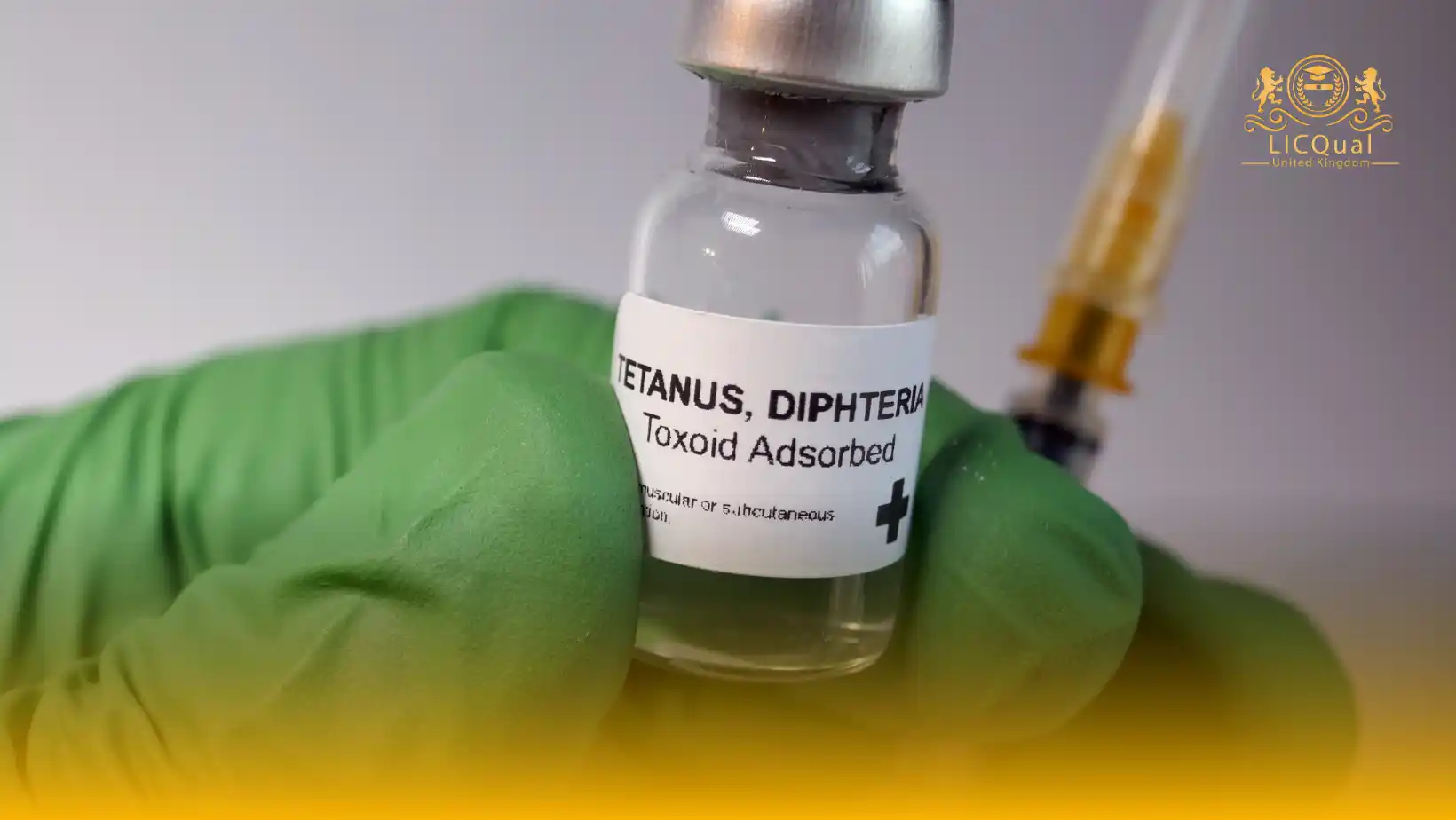The LICQual Level 7 Postgraduate Diploma in Infectious Diseases and Tropical Medicine (PgDIDTM) is an advanced qualification designed for healthcare professionals seeking specialised expertise in infectious diseases, tropical medicine, and global health challenges. This course is not intended for fresh entrants but is ideal for physicians, infectious disease specialists, microbiologists, nurses, and allied healthcare professionals who wish to enhance their career prospects, broaden their clinical knowledge, and strengthen their Continuing Professional Development (CPD).
Learners will gain comprehensive knowledge of bacterial, viral, parasitic, and fungal infections, as well as emerging and re-emerging infectious diseases. The curriculum emphasises advanced diagnostic techniques, antimicrobial stewardship, treatment protocols, outbreak management, and the integration of evidence-based practice in tropical and global health settings. Learners will also explore preventive strategies, vaccination programmes, and public health interventions relevant to endemic and epidemic conditions.
Centres delivering this qualification are required to employ competent and qualified staff, supported by modern laboratories, clinical facilities, and extensive learning resources. This ensures learners receive expert guidance, practical training, and academic support necessary for successful completion of this advanced programme.
Upon completion, learners will be equipped to assume leadership roles in infectious disease management, contribute to global health initiatives, implement best practices in patient care, and engage in clinical research. This qualification represents a significant step for professionals committed to excellence, advanced clinical practice, and career progression in infectious diseases and tropical medicine.
Course Overview
Qualification Title
LICQual Level 7 Postgraduate Diploma in Infectious Diseases and Tropical Medicine (PgDIDTM)
Total Units
6
Total Credits
120
GLH
600
Qualification #
LICQ2200983
Qualification Specification
To enroll in the LICQual Level 7 Postgraduate Diploma in Infectious Diseases and Tropical Medicine (PgDIDTM), applicants must meet the following criteria:
|
Qualification# |
Unit Title |
Credits |
GLH |
|---|---|---|---|
|
LICQ2200983-1 |
Advanced Microbiology and Pathogenesis |
20 |
100 |
|
LICQ2200983-2 |
Diagnostic Techniques in Infectious Diseases |
20 |
100 |
|
LICQ2200983-3 |
Clinical Management of Infectious Diseases |
20 |
100 |
|
LICQ2200983-4 |
Tropical Medicine and Global Health |
20 |
100 |
|
LICQ2200983-5 |
Research Methods and Evidence-Based Practice |
20 |
100 |
|
LICQ2200983-6 |
Professional Practice, Ethics, and Continuing Development |
20 |
100 |
By the end of this course, learners will be able to:
Unit 1: Advanced Microbiology and Pathogenesis
By the end of this unit, learners will be able to:
- Analyse the characteristics and pathogenic mechanisms of bacteria, viruses, fungi, and parasites.
- Evaluate host-pathogen interactions and the body’s immune response to infection.
- Assess the impact of emerging and re-emerging infectious agents on public health.
- Apply microbiological knowledge to inform clinical diagnosis and treatment strategies.
Unit 2: Diagnostic Techniques in Infectious Diseases
By the end of this unit, learners will be able to:
- Demonstrate expertise in laboratory diagnostics, including culture methods, serology, and molecular techniques (PCR).
- Interpret imaging and functional test results in the context of infectious diseases.
- Integrate diagnostic findings to guide patient management and outbreak control.
- Apply advanced diagnostic approaches in clinical and public health settings.
Unit 3: Clinical Management of Infectious Diseases
By the end of this unit, learners will be able to:
- Develop evidence-based treatment plans for bacterial, viral, parasitic, and fungal infections.
- Implement antimicrobial stewardship strategies and manage drug resistance effectively.
- Manage endemic, epidemic, and global infectious disease cases using best practice guidelines.
- Critically evaluate clinical outcomes and adjust treatment plans accordingly.
Unit 4: Tropical Medicine and Global Health
By the end of this unit, learners will be able to:
- Analyse the epidemiology and clinical features of tropical and vector-borne diseases.
- Apply preventive strategies, vaccination programmes, and public health interventions in tropical medicine.
- Assess the challenges of delivering healthcare in resource-limited settings.
- Implement evidence-based practices to improve patient outcomes and public health globally.
Unit 5: Research Methods and Evidence-Based Practice
By the end of this unit, learners will be able to:
- Design and conduct research projects in infectious diseases and tropical medicine.
- Critically appraise scientific literature and integrate findings into clinical practice.
- Apply statistical methods to interpret research and audit data.
- Demonstrate ethical conduct and professionalism in research and clinical audits.
Unit 6: Professional Practice, Ethics, and Continuing Development
By the end of this unit, learners will be able to:
- Demonstrate knowledge of clinical governance, ethical frameworks, and legal responsibilities in infectious disease practice.
- Lead and collaborate effectively within multidisciplinary healthcare teams.
- Develop strategies for Continuing Professional Development (CPD) and reflective practice.
- Contribute to policy development and global health initiatives with professional integrity.
The LICQual Level 7 Postgraduate Diploma in Infectious Diseases and Tropical Medicine (PgDIDTM) is perfect for healthcare professionals who want to specialize in infectious diseases, tropical medicine, and global health. This course is ideal for doctors, specialists, researchers, and allied health professionals seeking advanced knowledge, practical skills, and international recognition. It combines theoretical understanding, clinical expertise, and research-focused learning to help professionals advance their careers and take on leadership roles in infectious disease management.
Medical Doctors and Physicians
- Gain advanced knowledge in infectious disease diagnosis and management
- Learn treatment strategies for emerging and tropical diseases
- Develop clinical decision-making and patient care expertise
- Enhance skills in outbreak response and epidemic control
- Obtain a UK-recognized Level 7 postgraduate diploma
- Prepare for leadership roles in hospitals and clinics
Infectious Disease Specialists
- Deepen understanding of HIV/AIDS, malaria, tuberculosis, and other infectious diseases
- Master evidence-based treatment and patient management
- Gain practical skills in diagnostic and laboratory techniques
- Learn outbreak investigation and control strategies
- Improve patient outcomes through specialized care
- Enhance professional credibility internationally
Tropical Medicine Professionals
- Study tropical and travel-related diseases in depth
- Learn strategies for prevention, treatment, and control
- Develop skills in public health and global health initiatives
- Apply clinical knowledge to resource-limited settings
- Strengthen multidisciplinary teamwork and patient care
- Access flexible study options for busy professionals
Biomedical Scientists and Researchers
- Explore pathogen biology, immunology, and disease mechanisms
- Conduct applied research in infectious and tropical diseases
- Collaborate with clinicians on clinical trials and studies
- Present research findings in academic and professional forums
- Contribute to innovations in diagnostics and treatment
- Expand career opportunities in research and academia
Healthcare Administrators and Managers
- Understand management of infectious disease departments
- Develop policies for infection control and patient safety
- Learn operational planning and resource allocation
- Improve clinical governance and healthcare quality
- Strengthen leadership and decision-making skills
- Support national and global health initiatives
International Medical Graduates and Specialists
- Gain a UK-recognized diploma for global career mobility
- Adapt knowledge to international healthcare standards
- Strengthen credentials for licensure or specialist recognition abroad
- Access flexible online and blended learning options
- Join a network of global infectious disease and tropical medicine professionals
- Expand opportunities for clinical, research, and teaching roles
Academic and Teaching Professionals
- Integrate infectious disease and tropical medicine knowledge into curricula
- Mentor and train healthcare students and professionals
- Conduct academic research and publish findings
- Strengthen institutional reputation with an accredited diploma
- Develop workshops and specialized training programs
- Enhance career portfolio with a Level 7 qualification
Centres delivering the LICQual Level 7 Postgraduate Diploma in Infectious Diseases and Tropical Medicine must meet strict standards to ensure high-quality education and learner success. Key requirements include:
- Qualified and Experienced Staff: All teaching and assessment personnel must be highly qualified in infectious diseases, tropical medicine, microbiology, or related healthcare disciplines, with substantial clinical and academic experience.
- Modern Clinical and Laboratory Facilities: Centres must provide access to laboratories, diagnostic units, clinical simulation environments, and practical training areas essential for advanced study and hands-on learning.
- Comprehensive Learning Resources: Learners should have access to textbooks, academic journals, case studies, digital learning platforms, and other resources supporting in-depth study and research.
- Practical Training Opportunities: Centres must facilitate hands-on exercises, clinical simulations, outbreak management scenarios, and case-based learning relevant to infectious diseases and tropical medicine.
- Rigorous Assessment and Evaluation: Centres must implement robust assessment strategies, including written assignments, research projects, and practical evaluations, to ensure learners achieve all learning outcomes.
- Ethical and Legal Compliance: Centres must adhere to professional, ethical, and legal standards in infectious disease education and clinical practice.
- Support for Continuing Professional Development (CPD): Centres should provide guidance for ongoing CPD, reflective practice, and professional development, enabling learners to apply advanced knowledge in clinical and global health settings.
Meeting these requirements ensures learners receive world-class instruction, practical experience, and academic support, preparing them for leadership and advanced practice in infectious diseases and tropical medicine.
Assessment and Verification
All units within this qualification are subject to internal assessment by the approved centre and external verification by LICQual. The qualification follows a criterion-referenced assessment approach, ensuring that learners meet all specified learning outcomes.
To achieve a ‘Pass’ in any unit, learners must provide valid, sufficient, and authentic evidence demonstrating their attainment of all learning outcomes and compliance with the prescribed assessment criteria. The Assessor is responsible for evaluating the evidence and determining whether the learner has successfully met the required standards.
Assessors must maintain a clear and comprehensive audit trail, documenting the basis for their assessment decisions to ensure transparency, consistency, and compliance with quality assurance requirements.







